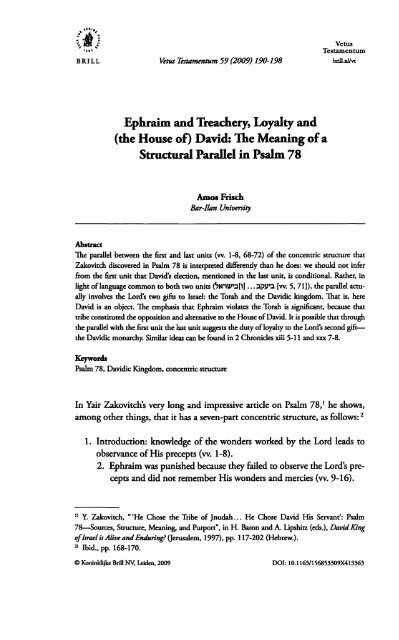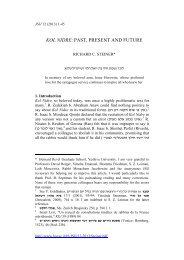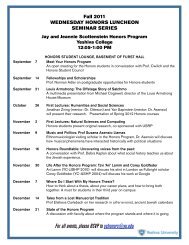David: The Meaning of a Structural Parallel in Psalm 78 - Yeshiva ...
David: The Meaning of a Structural Parallel in Psalm 78 - Yeshiva ...
David: The Meaning of a Structural Parallel in Psalm 78 - Yeshiva ...
Create successful ePaper yourself
Turn your PDF publications into a flip-book with our unique Google optimized e-Paper software.
A Frisch I Vetus Testamentum 59 (2009) 190-198 197Do not be like your fathers and your brethren, who were faithless to the LordGod <strong>of</strong> their fathers, so that He made them a desolation, as you see. Do notnow be stiff-necked as your fathers were, but yield yourselves to the Lord, andcome to His sanctuary, which He has sanctified for ever, and serve the Lordyour God, that His fierceanger may turn away from you. (w. 7-8)Abijah refers to the perpetual reign <strong>of</strong> the dynasty; Hezekiah, to the perpetualsanctity <strong>of</strong> the Temple. Note too the verbal echo between Hezekiahs "do notbe like your fathers", and <strong>Psalm</strong> <strong>78</strong>, "they should not be like their fathers, astubborn and rebellious generation, a generation whose heart was not steadfast,whose spirit was not faithful to God" (Ps. lxxviii 8), as well as the wordsthat beg<strong>in</strong> the next verse: "<strong>The</strong> Ephraimites" (v. 9).<strong>The</strong> echoes <strong>in</strong> the two verses from Chronicles, spoken by k<strong>in</strong>gs <strong>of</strong> Judah,do not make a significant contribution to the debate about when our <strong>Psalm</strong>was composed (remember, too, the conditional nature <strong>of</strong> Solomons legacy <strong>in</strong>1 Chr. xxviii 7 and 9). 12 1 do not believe that they carry any decisive weightfor the thorny problem <strong>of</strong> the dat<strong>in</strong>g <strong>of</strong> <strong>Psalm</strong> <strong>78</strong>, with the proposed solutionsrang<strong>in</strong>g over many centuries, from <strong>David</strong>s reign to the post-exilic era. 13In any case, the explanation proposed here for the structural parallel—theview <strong>of</strong> the <strong>David</strong>ic monarchy as a div<strong>in</strong>e boon whose cont<strong>in</strong>uation does not12)See S. Japhet, <strong>The</strong> Ideology <strong>of</strong> the Book <strong>of</strong> Chronicles and its Place <strong>in</strong> Biblical Thought (seconded.; trans. A. Barber; Frankfurt am Ma<strong>in</strong>, 1997), p. 391.13)Here are some <strong>of</strong> the many op<strong>in</strong>ions about the dat<strong>in</strong>g <strong>of</strong> the <strong>Psalm</strong>: the tenth century BCE,around die time <strong>of</strong> <strong>David</strong> (Α. E Campbell, "<strong>Psalm</strong> <strong>78</strong>: A Contribution to the <strong>The</strong>ology <strong>of</strong>Tenth Century Israel", CBQ41 [1979], pp. 51-79); before the division <strong>of</strong> the k<strong>in</strong>gdom (Eerdmans,<strong>The</strong> Hebrew Book <strong>of</strong> <strong>Psalm</strong>s, p. 381); when Solomon built the Temple (Loewenstamm,<strong>The</strong> Evolution <strong>of</strong> the Exodus Tradition, pp. 75-76); between the division <strong>of</strong> the k<strong>in</strong>gdom and thedestruction <strong>of</strong> Samaria (M. Dahood, <strong>Psalm</strong>s II [AB 17; Garden City, 1968], p. 238); dur<strong>in</strong>gthe reign <strong>of</strong> Hezekiah (B. Weber, "Zur Datierung der Asaph-<strong>Psalm</strong>en 74 und 79", Biblica 81[2000], pp. 521-532); dur<strong>in</strong>g the reign <strong>of</strong> Josiah (A. A. Anderson, <strong>The</strong> Book <strong>of</strong> the <strong>Psalm</strong>s, II[NCB; London, 1972], p. 562; Zakovitch, "He Chose", pp. 181-182); after the destruction <strong>of</strong>the Temple, as a restoration psalm (A. Berl<strong>in</strong>, "<strong>Psalm</strong>s and the Literature <strong>of</strong> Exile: <strong>Psalm</strong>s 137,44, 69, and <strong>78</strong>", <strong>in</strong> P. W. Fl<strong>in</strong>t and P. D. Miller [eds.], <strong>The</strong> Book <strong>of</strong> <strong>Psalm</strong>s: Composition andReception [VTSup 99; Leiden and Boston, 2005] pp. 75-84); <strong>in</strong> the early days <strong>of</strong> die return toZion, as an anti-Samaritan polemic (Gunkel, Die <strong>Psalm</strong>en, p. 342); and, f<strong>in</strong>ally, latest <strong>of</strong> all,dur<strong>in</strong>g the Ptolemaic age (L. F<strong>in</strong>kelste<strong>in</strong>, "Pre-Maccabean Documents <strong>in</strong> the Passover Haggadah[Part 2]", HTR 36 [1943], pp. 24-27) or dur<strong>in</strong>g the time <strong>of</strong> John Hyrcanus (B. Duhm, Die<strong>Psalm</strong>en [KHC; Tüb<strong>in</strong>gen, 1899], p. 206). But widi all these attempts at precise dat<strong>in</strong>g, weshould always remember Loewenstamm s observation: "<strong>The</strong> precarious nature <strong>of</strong> the attempts atdat<strong>in</strong>g each psalm <strong>in</strong> the Psalter are among the best-known maladies <strong>of</strong> biblical scholarship"{<strong>The</strong> Evolution <strong>of</strong> the Exodus Tradition, p. 71).
198 Α. Frisch I Vetus Testamentum 59 (2009) 190-198depend on the behavior <strong>of</strong> the <strong>in</strong>dividual k<strong>in</strong>gs (parallel to the everlast<strong>in</strong>gsanctity <strong>of</strong> the Temple), and the allusion to loyalty to <strong>David</strong>, demanded particularly<strong>of</strong> rebellious Ephraim—would seem to favor a date between Jeroboamsrebellion (1 Kgs xi 26-27, 40) and the destruction <strong>of</strong> the NorthernK<strong>in</strong>gdom.In conclusion, let us go back to the three problems we raised at the outsetand see how they can be solved <strong>in</strong> light <strong>of</strong> the thesis presented here. (1) Wenoted a l<strong>in</strong>guistic parallel between the first and seventh units and suggestedthat there is also a conceptual equation <strong>of</strong> the Lord s two gifts to his people.This provides a solid basis for the parallel between these two units, noted byZakovitch on formal grounds only. (2) We did not apply the obligation tobe faithful to the Torah, imposed on the people <strong>of</strong> Israel <strong>in</strong> the first unit, to<strong>David</strong> s descendants <strong>in</strong> the seventh unit, such that the cont<strong>in</strong>ued election <strong>of</strong>Jerusalem and <strong>David</strong> is conditional on the k<strong>in</strong>gs' behavior. Instead we emphasizedthe elements that are be<strong>in</strong>g compared: <strong>David</strong> (along with Jerusalem andthe Temple) 14is equated with the Torah as the Lords gifts to the people.(3) <strong>The</strong> k<strong>in</strong>gs <strong>of</strong> the House <strong>of</strong> <strong>David</strong> are not called on to display loyalty tothe Lord as a condition <strong>of</strong> dynastic cont<strong>in</strong>uity. Rather, if any such idea therebe, it is that the people must be loyal to the House <strong>of</strong> <strong>David</strong> and Jerusalem 15and not follow <strong>in</strong> the errant footsteps <strong>of</strong> the rebellious tribe <strong>of</strong> Ephraim.14)On the emphasis <strong>in</strong> <strong>Psalm</strong> <strong>78</strong> on the election <strong>of</strong> <strong>David</strong> (rather than on the election <strong>of</strong> Judahand <strong>of</strong> Jerusalem), see Hossfeld and Zenger, <strong>Psalm</strong>s 2, p. 292.15)Several traditional commentators remarked the political message <strong>of</strong> <strong>Psalm</strong> <strong>78</strong>, <strong>in</strong>clud<strong>in</strong>gAbraham Ibn Ezra on v. 9: "And accord<strong>in</strong>g to the pla<strong>in</strong> mean<strong>in</strong>g, the thrust <strong>of</strong> this psalm refersto the <strong>David</strong>ic k<strong>in</strong>gdom and the build<strong>in</strong>g <strong>of</strong> Mount Zion"; Menahem Hame'iri on v. 1: "<strong>The</strong>purpose <strong>of</strong> the psalm is to proclaim the merit <strong>of</strong> the k<strong>in</strong>gdom <strong>of</strong> the House <strong>of</strong> <strong>David</strong>, and thatits k<strong>in</strong>gship came from the Lord by the ancient prophecy" (see also his comments on w. 12 and70); Malbim on v. 1: "<strong>The</strong> poets <strong>in</strong>tention was to support the k<strong>in</strong>gdom <strong>of</strong> the House <strong>of</strong> <strong>David</strong>and the Temple that he built, aga<strong>in</strong>st the k<strong>in</strong>gdom <strong>of</strong> Ephraim and aga<strong>in</strong>st [the tribe] <strong>in</strong> whoseterritory the Tabernacle had stood". Among the moderns we should mention Yair H<strong>of</strong>fman,who f<strong>in</strong>ds two historical surveys <strong>in</strong> <strong>Psalm</strong> <strong>78</strong>, each widi its own message; the second survey(w. 40-72), he says, conveys "a historical and political lesson: the rejection <strong>of</strong> the House <strong>of</strong>Joseph and the election <strong>of</strong> the House <strong>of</strong> <strong>David</strong> are presented as a direct conclusion both <strong>of</strong>the course <strong>of</strong> the nations history and <strong>of</strong> the summary <strong>in</strong> w. 38-39" (H<strong>of</strong>fman, <strong>The</strong> Doctr<strong>in</strong>e<strong>of</strong> the Exodus, p. 99). See also R. P. Carroll, "<strong>Psalm</strong> lxxviii: Vestiges <strong>of</strong> a Tribal Polemic",VT2Ì (1971), pp. 133-150.
^ sCopyright and Use:As an ATLAS user, you may pr<strong>in</strong>t, download, or send articles for <strong>in</strong>dividual useaccord<strong>in</strong>g to fair use as def<strong>in</strong>ed by U.S. and <strong>in</strong>ternational copyright law and asotherwise authorized under your respective ATLAS subscriber agreement.No content may be copied or emailed to multiple sites or publicly posted without thecopyright holder(s)' express written permission. Any use, decompil<strong>in</strong>g,reproduction, or distribution <strong>of</strong> this journal <strong>in</strong> excess <strong>of</strong> fair use provisions may be aviolation <strong>of</strong> copyright law.This journal is made available to you through the ATLAS collection with permissionfrom the copyright holder(s). <strong>The</strong> copyright holder for an entire issue <strong>of</strong> a journaltypically is the journal owner, who also may own the copyright <strong>in</strong> each article. However,for certa<strong>in</strong> articles, the author <strong>of</strong> the article may ma<strong>in</strong>ta<strong>in</strong> the copyright <strong>in</strong> the article.Please contact the copyright holder(s) to request permission to use an article or specificwork for any use not covered by the fair use provisions <strong>of</strong> the copyright laws or coveredby your respective ATLAS subscriber agreement. For <strong>in</strong>formation regard<strong>in</strong>g thecopyright holder(s), please refer to the copyright <strong>in</strong>formation <strong>in</strong> the journal, if available,or contact ATLA to request contact <strong>in</strong>formation for the copyright holder(s).About ATLAS:<strong>The</strong> ATLA Serials (ATLAS®) collection conta<strong>in</strong>s electronic versions <strong>of</strong> previouslypublished religion and theology journals reproduced with permission. <strong>The</strong> ATLAScollection is owned and managed by the American <strong>The</strong>ological Library Association(ATLA) and received <strong>in</strong>itial fund<strong>in</strong>g from Lilly Endowment Inc.<strong>The</strong> design and f<strong>in</strong>al form <strong>of</strong> this electronic document is the property <strong>of</strong> the American<strong>The</strong>ological Library Association.







